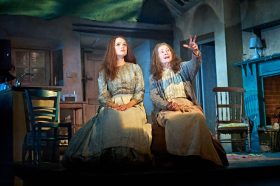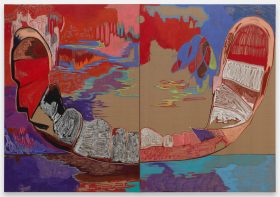Many of us toy with the dream of being part of the glitz and glamour of theatre, and although it is usually the actor or director’s name up in lights, it is the writer who is often central to the mystery and dramatics of the theatre.
Many out of work actors, performers and even other arts professionals have tried their hand at writing for the stage at some point in their careers, but how do you really make it as a playwright?
Who better to ask than freelance dramaturg, playwright and university lecturer, David Lane.
David has been listed in the top 100 of 1800 entries for the Bruntwood Prize 2006. He made the top 50 in the Royal Court Young Writers Programme 2006, and his plays, The Greatest Story Ever Told and One Day I Wasn’t There, are both in the longlist for this year’s King’s Cross Award for New Writing at the Courtyard Theatre.
Here are five insightful steps towards making it as a playwright:
A playwright – a person that writes plays right? Well, it’s a lot more than you first think…
“When I was starting out, I thought playwrights just wrote scripts,” shares David. “What they actually do is more varied. This was a great discovery, as it made the idea of being a playwright more challenging and more interesting to me.”
“It all depends on the context of their work. A playwright working with a devising company will be doing different things to one who is working alone. I think it can be dangerous to compartmentalise playwrights into one homogenous role, because that sort of thing can erode an instinct for innovation and questioning of how we make work. Britain already suffers from a fear of theory and of intellectual rigour in their theatre-making, often because we’re fond of boxing people in to specific roles. I think the truth is that things are much more complex.”
Write, write and write some more
“At university I took a dramaturgy module and adapted a short story by Daphne Du Maurier as part of my coursework, which got me interested in the translation between mediums and what it was that theatre could achieve which literature couldn’t,” says David, looking back on how he first started his career. “Shortly after that I won a one-act playwriting competition – which gave me a bit of a boost – then wrote prolifically (and pretty averagely!) for another year or so. I did an internship at the Royal Court in between my BA and my MA, when my passion for playwriting, especially working with other writers was ignited fully through working alongside Simon Stephens and David Eldridge on the Young Writers Programme. I was only a workshop assistant, but the impact from watching their commitment and sheer belief in theatre and new writing was etched on my brain from then onwards.”
“I now work freelance as a dramaturg, playwright and university lecturer,” says David. “The emphasis on these roles changes throughout the year depending on what comes up and which projects I might choose to initiate, or am approached to get involved in. These can happen via word-of-mouth, through informal approaches from writers, companies and educational institutions, or the conventional job application route. Each of these roles – broadly speaking – has a common factor in that they all involve the making of new texts for performance. Over the last five years that has encompassed a variety of tasks including working with young people in devising and creative writing; research for commissioned playwrights; workshop development on plays with performers, student playwrights and professional playwrights; developing my own work with fringe theatres in London; running new writing competitions; leading modules in dramaturgy, playwriting and British new writing at HE level and a lot more. It’s a very diverse existence and fortunately the experiences have a cumulative effect on my ability to work in varying contexts.”
Get your work out there
David got started as a professional by initially handing in script reports he’d done during his degree to all the theatres in London that specialised in new writing. “Shortly afterwards the Gate and Soho took me on,” says David.
“Fortuitously, the Gate were looking for a head reader and I had that post for six months, then a few months later started part-time at Soho Theatre as their literary assistant. Whilst this wasn’t carrying out my own playwriting, it was engaging on a daily basis with reading international new work (at the Gate) and British new writing, and immersing myself in the world of scripts and script development. The MA in Writing for Performance at Goldsmiths was also crucial at giving me a professional and practical kick-start. I met lots of theatre practitioners and simply stayed in touch with them. “
Be prepared to embrace the f words: flexible and freelance
Most writers, within theatre and other fields work on a freelance basis and are therefore self-employed so also have to be self motivated.
Describing a typical week’s work, David says that he’s been: writing a treatment for a new draft of a play for Theatre 503 in Battersea; attending workshops to help with a second draft for his commission from Half Moon; preparing notes on a play from a graduate writer from a London university so we can have an informal script surgery; planning a one-day workshop with actors and a writer under commission from the Theatre Upstairs at the Globe Pub in Exeter; collating resources for a session on translation with Level 2 students at Exeter university where he is a Visiting Dramaturg; and on the afternoon we speak he has just got back from a playwriting session at Brunel with their final year students.
“Next week I’m meeting with a theatre in Sevenoaks to discuss setting up two playwriting groups,” he adds.
This year has been the first time he hasn’t had to take on any forms of extra employment. “In the summer I used to temp for around four to five weeks just to bring some regular money in, but it’s how you apply your skills across a multitude of roles and projects that really matters. I could just sit inside and write stage plays all day, but it wouldn’t earn me a living – it earns very, very few people a living in truth. You have to think laterally about what skills you’ve got and how to apply them.”
Make your own opportunities and keep learning
There are lots of initiatives and opportunities out there, so go for it, is the basic advice.
David agrees that there are a lot of initiatives encouraging first time playwrights, “sometimes there’s a danger, in fact, that there’s too much development and ‘nurturing’ of new writing going on and not enough commitment to producing the work of writers who already exist and have still only had one play produced.”
David feels that a lot more can be done to support writers above the age of 26 “that’s not me moaning,” says David, “it’s a reality of the new writing culture and the unhealthy tendency to idolise the new before anything else. I could talk about it for hours, but instead I’d recommend people go to the Writernet website and delve in. Anything you need to know about getting into playwriting can be found there, it’s a brilliant resource.”
Asked to outline three essential things needed to be able to do the job, David picks commitment, tenacity and diplomacy. “Don’t give up. Learn to separate the criticism you need from the criticism that you don’t, and to ask yourself difficult questions about what you still need to learn. Get involved in seeing work and making work whenever you can. Aim high and never forget the audience.”
So, there you have it: five real pieces of advice to get you started as a playwright.
As they say there’s a story in all of us – it’s making a living out of it that’s the hard part. Hopefully these five steps will help you on your way.
David Lane is currently visiting Dramaturg at Exeter University and Artistic Associate of the Tickle Theatre Company. For more information on David Lane and his work please visit myspace.com/davidjohnlane and also tickletheatre.co.uk




